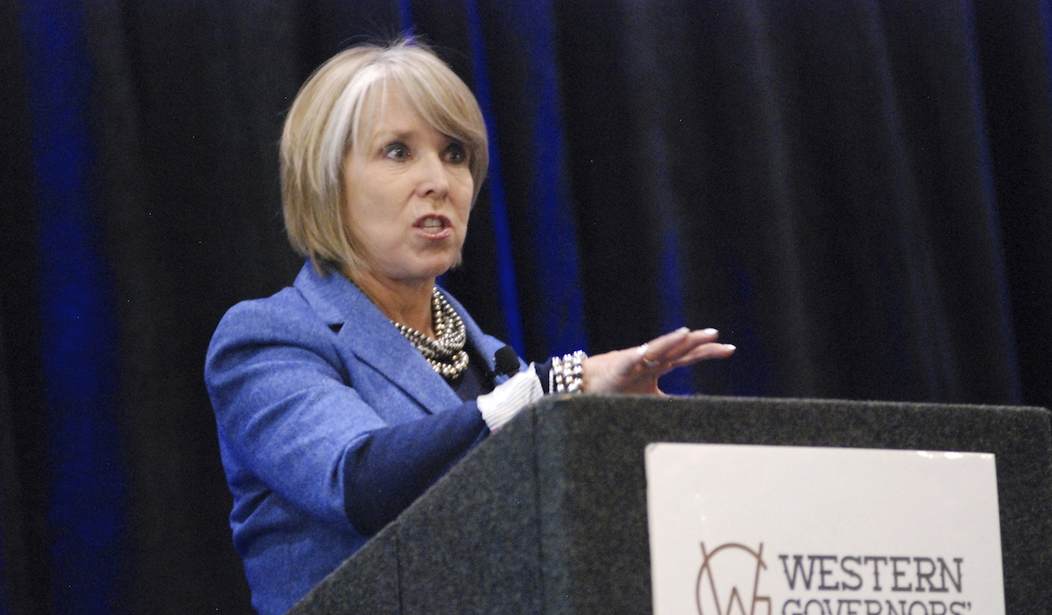After a federal judge granted a restraining order blocking Michelle Lujan Grisham from suspending the right to carry in Albuquerque and Bernalillo County, the New Mexico governor decided to revise her edict rather than simply take the loss. Now her latest attempt to chill the Second Amendment rights of New Mexicans will get its own hearing before U.S. District Judge David Urias, who’ll decide whether the revised order banning open and concealed carry at parks and playgrounds in the Albuquerque area can be enforced under her declared public health emergency over “gun violence”.
Today’s hearing was first scheduled for Urias to rule on a request for a more permanent injunction against the governor’s original order, but now the focus will be on Grisham’s scaled-back order. Unfortunately, based on some of Urias’s comments during the first hearing, I have a feeling this time the governor might be able to claim success once the judge issues his decision.
U.S. District Judge David Urias ruled last month that gun restrictions in the governor’s original order were likely to cause irreparable harm to people deprived of the right to carry a gun in public for self-defense and granted a temporary restraining order blocking it until Tuesday’s hearing.
The governor has tied the suspension of some gun rights to a statistical threshold for violent crime that applied only to Albuquerque and the surrounding area.
Urias said in a recent court filing that restrictions on gun activity at playgrounds and other places where children play “may very well be constitutional.”
State police briefly would have authority under the order to assess civil penalties and fines of up to $5,000 for infractions. The sheriff and Albuquerque’s police chief had refused to enforce it.
The order has energized advocates for gun rights, including Republican lawmakers who have threatened impeachment proceedings against Lujan Grisham.
Some influential Democrats and civil rights leaders warn that the governor’s move could do more harm than good to overall efforts to ease gun violence, and the Democratic state attorney general has urged her to reconsider.
Actual laws declaring parks and playgrounds to be “sensitive places” where concealed carry is prohibited have met with mixed results in the federal courts. Most recently, a federal judge in Maryland declined to grant a TRO blocking enforcement of the state’s newly-enacted ban in those locations, ruling that there’s a historical tradition of prohibiting firearms in parks. From the decision:
Very few public parks existed at the time the Second Amendment was ratified, and those that did exist were typically located in cities. Plaintiffs thus argue that because these parks existed and were not regulated, there is no historical tradition of regulation in parks. Their argument misses the mark for several reasons. First, Plaintiffs point to just a handful of parks in existence at the time of the founding such as Boston Common and New York’s City Hall Park. The Court cannot infer that parks were historically not regulated from so few places. Further, not only were there few parks at that time, but these parks did not resemble the modern, expansive State and federal park system that the United States has today. Boston Common, for example, “was used primarily as a pasture, a place of execution, and site for the militia to muster and drill.” Notably, it was not completely unregulated, and militia were prohibited from “coming to muster with a loaded firearm.”
The historical record further shows that as States and cities created more parks, they also imposed firearm regulations. Around the time the Fourteenth Amendment was ratified, several jurisdictions prohibited firearms in public parks, including: New York City, Philadelphia, Chicago, St. Louis, and Boston. Novotny Plaintiffs argue that these are urban parks, so there is no precedent for a ban of all state However, rural, more isolated state parks were not established in significant numbers until after the ratification of the Fourteenth Amendment, and thus the Court will not infer a lack of regulation from the absence of laws governing rural state parks at that time. Lastly, the Court finds that SB 1’s public park ban imposes the same burden on the right to armed self-defense as these historical statutes, and the laws are comparably justified by the need for public safety.
Grisham’s attorney will likely point to Judge George L. Russell III’s opinion in court today, though I think his argument is a fairly weak one. A handful of locations that prohibited lawful carrying in parks in the mid-19th century isn’t exactly strong evidence that these bans were widespread or longstanding, and there’s absolutely no evidence in the historical record of a governor ever trying to impose such a ban unilaterally.
Beyond the law, there’s also a common sense argument against Grisham’s revised order. If Albuquerque has become so dangerous that Grisham has declared a state of emergency, then parents taking their kids to the playground or a senior citizen who wants to get her 10,000 steps in at a public park in the city have good reason to want to bear arms in self-defense. In fact, I’d say that need is even more acute during an emergency, and yet the governor wants to forbid them from doing so even though she’s admitted that actual criminals aren’t going to pay any attention to her order. Banning open and concealed carry in those places won’t make them safer. It will make them a target-rich environment for violent predators looking for their next victim.
Grisham clearly doesn’t care about that, and I doubt it will be a factor in Urias’s decision either. The big question is whether the governor can actually get any agency to enforce her revised edict if the judge allows it to stand.









Join the conversation as a VIP Member